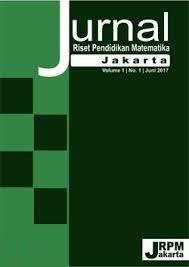Pengaruh Penerapan Model Pembelajaran Thinking Aloud Pair Problem Solving (TAPPS) terhadap Kemampuan Pemecahan Masalah Matematika
DOI:
https://doi.org/10.21009/jrpmj.v4i1.25701Keywords:
learning model, thinking aloud pair problem solving, problem solving abilityAbstract
This study aims to determine the effect of the Thinking Aloud Pair Problem Solving (TAPPS) learning model on the mathematical problem solving abilities of eighth grade students of SMP. This research is a quasi-experimental research with Non-Equivalent Control Group Design. The population in this study were all eighth grade students of SMP. In determining the sample, the saturated sample technique was used, where the samples in this study were class VIII-A as the control class and class VIII-B as the experimental class. The instrument used in this research is a test of mathematical problem solving ability on number pattern material. Quantitative data analysis was performed using a gain t-test. The results of data analysis obtained thitung = 2.14 and ttable = 2.064 so that thitung > ttable then H0 is rejected which indicates that there are differences in students' mathematical problem solving abilities between classes that receive TAPPS learning and direct learning. This shows that learning with the TAPPS model has an effect on the mathematical problem solving abilities of eighth grade students of SMP. The influence of the application of the Thinking Aloud Pair Problem Solving (TAPPS) learning model on the mathematical problem solving ability of class VIII students at SMP on the number pattern material using the effect size formula (d) is 1.907, which means that the effect given has a high category.
References
Arikunto, S. (2013). Prosedur Penelitian Suatu Pendekatan Praktik. Jakarta: Rineka Cipta.
Junita, B.A. (2015). Implementasi Think Aloud Pair Problem Solving (TAPPS) Berbantuan Media Kartu Bergambar Terhadap Kemampuan Pemecahan Masalah Dan Hasil Belajar Kognitif Siswa. Jurnal Ilmiah Pendidikan Kimia “Hydrogen”, 5(2), 274-282. https://e-journal.undikma.ac.id/index.php/hydrogen/issue/view/86
Khabibah, S. & Sari, M.N. (2017). Penerapan Pembelajaran Thinking Aloud Pair Problem Solving (TAPPS) Pada Materi Bangun Ruang Sisi Datar Kelas VIII SMP Negeri 1 Turi Lamongan. Jurnal Ilmiah Pendidikan Matematika (JIPM), 3(6), 98-106. https://doi.org/10.26740/mathedunesa.v6n3.p%25p
Purwaningrum, J.P. (2016). Disposisi Matematis Siswa SD Melalui Model Pembelajaran Thingking Aloud Pair Problem Solving. Suska Jurnal of Mathematica Education, 2(2), 125-130. http://dx.doi.org/10.24014/sjme.v2i2.2200.
Setiawati, N.L.P., Dantes, N., & Candiasa, I.M. (2015). Pengaruh Model Pembelajaran Kooperatif Thinking Aloud Pair Proble Solving (TAPPS) Berbantuan LKS Terhadap Sikap Sosial Dan Hasil Belajar Matematika Siswa Kelas VI SLB Negeri Gianyar. Jurnal Program Pascasarjana Universitas Pendidikan Ganesha Program Studi Penelitian dan Evaluasi Pendidikan, 5(1), 1-10. https://doi.org/10.23887/jpepi.v5i1.1544
Sugiyono. (2013). Metode Penelitian Kombinasi (Mixed Methods). Bandung: Alfabeta.
Suherman, E. (2003). Strategi Pembelajaran Matematika Kontemporer. Bandung: Universitas Pendidikan Indonesia.
Sundayana, Rostina. (2016). Statistika Penelitian Pendidikan. Bandung: Alfabeta.
Trianto. (2007). Model-Model Pembelajaran Inovatif Berorientasi Konstruktivistik. Surabaya: Prestasi Pustaka.
Turmuzi, M. (2017). Strategi Pembelajaran Matematika. Mataram: FKIP Universitas Mataram.
Turmuzi, M., Sripatmi., Azmi, S., & Hikmah, N. (2018). Penerapan Model PembelajaranCreative Problem Solving (CPS) Untuk Meningkatkan Kemampuan Pemecahan Masalah Mahasiswa Pendidikan Matematika. Jurnal Pijar MIPA, XIII(1), 45-50. http://dx.doi.org/10.29303/jpm.v13i1.470
Warsono & Hariyanto. (2017). Pembelajaran Aktif Teori dan Asesmen. Bandung: PT Remaja Rosdakarya.
Wijayanti & Taat. (2016). Efektivitas Model CTL Dan Model PBL Terhadap Hasil Belajar IPS. Harmoni Sosial Jurnal Pendidikan IPS, 3(2), 116. https://doi.org/10.21831/hsjpi.v3i2.7908
Wulandari, A. N., Sukestiyarno, Y. L., & Sugiman. (2013). Pengembangan Karakter dan Pemecahan Masalah Peserta Didik Melalui Pembelajaran Matematika dengan Model TAPPS Berbantuan Kartu Permasalahan Kelas VII Pada Materi Segiempat. UNNES Journal of Mathematics Education, 2(3), 40-46. https://doi.org/10.15294/ujme.v2i3.3364




